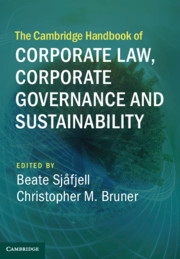Book contents
- Reviews
- The Cambridge Handbook of Corporate Law, Corporate Governance and Sustainability
- The Cambridge Handbook of Corporate Law, Corporate Governance and Sustainability
- Copyright page
- Dedication
- Contents
- Contributors
- Forewords
- Preface
- Introduction
- Part I Global Business and Fragmented Regulation
- 2 Trade, Investment and Corporate Sustainability
- 3 Extraterritorial Attempts at Addressing Challenges to Corporate Sustainability
- 4 Defragmenting Transnational Business Responsibility
- 5 Sustainability and the Move from Corporate Governance to Governance through Contract
- Part II Corporate Law, Financial Markets and Sustainability
- Part III Corporate Law, Corporate Governance and Sustainability: Case Studies
- Part IV Potential Drivers for Change
- Conclusion
- Index
2 - Trade, Investment and Corporate Sustainability
from Part I - Global Business and Fragmented Regulation
Published online by Cambridge University Press: 25 November 2019
- Reviews
- The Cambridge Handbook of Corporate Law, Corporate Governance and Sustainability
- The Cambridge Handbook of Corporate Law, Corporate Governance and Sustainability
- Copyright page
- Dedication
- Contents
- Contributors
- Forewords
- Preface
- Introduction
- Part I Global Business and Fragmented Regulation
- 2 Trade, Investment and Corporate Sustainability
- 3 Extraterritorial Attempts at Addressing Challenges to Corporate Sustainability
- 4 Defragmenting Transnational Business Responsibility
- 5 Sustainability and the Move from Corporate Governance to Governance through Contract
- Part II Corporate Law, Financial Markets and Sustainability
- Part III Corporate Law, Corporate Governance and Sustainability: Case Studies
- Part IV Potential Drivers for Change
- Conclusion
- Index
Summary
his chapter argues that capacity for corporate sustainability is shaped by over-arching rules determining trade and investment relations, but also that companies play a part in constructing those rules and their application. In this way, transnational state and corporate conduct are symbiotic, mutually capable of shaping each other. The General Agreement on Tariffs and Trade and the General Agreement on Trade in Services within the framework of the World Trade Organisation mediate the terms of import and export of goods and services, affecting corporate management of supply chain arrangements, but corporate influence also affects those rule-making and rule-administering processes. We investigate the capacity for norms promulgated through free trade agreements to affect the parameters of sustainable corporate conduct. Finally, we analyse the powers of corporations as investors, bearing in mind the current fragmented regime operating under international investment law alongside scope for reform.
Keywords
- Type
- Chapter
- Information
- Publisher: Cambridge University PressPrint publication year: 2019
- 3
- Cited by

